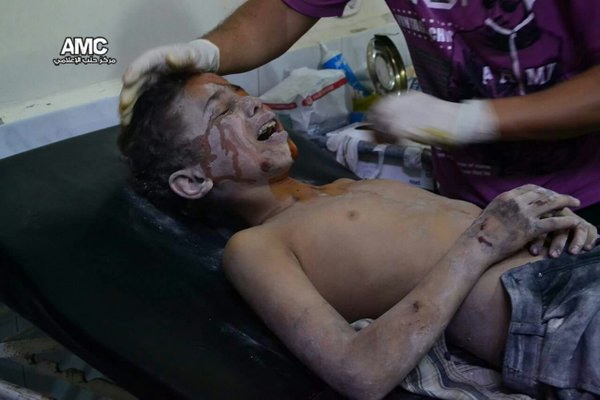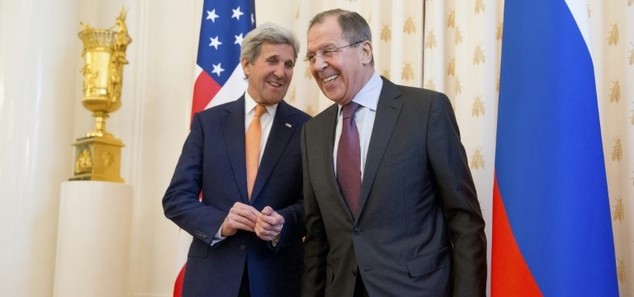PHOTO: US Secretary of State John Kerry and Russian Foreign Secretary Sergei Lavrov
LATEST
- Pro-Assad Counter-Attack Fails to Retake Zara in Homs Province
- At Least 12 Killed By Missile on Village in Idlib Province
- Video: Missile Hits Aleppo’s Sukkari District
- Central Bank’s 4th Intervention to Stop Collapsing Currency
- Rebel Faction Executes 2 Officials of Kurdish Militia YPG
UPDATE 1530 GMT: The International Syria Support Group has failed to agree a date for the resumption of talks between the regime and the opposition-rebel bloc, as their discussion on Tuesday yielded little prospect of an advance towards a political resolution.
In a statement at the end of session in Vienna, the 17-nation group urged renewed compliance with the February 27 “cessation of hostilities”, saying it would “use their influence” with the warring parties to obtain this. However, they offered a confusing explanation as to the measures if either the regime or rebels did not comply:
Where the co-chairs believe that a party to the cessation of hostilities has engaged in a pattern of persistent non-compliance, the Task Force could refer such behavior to the ISSG Ministers or those designated by the Ministers to determine appropriate action, including the exclusion of such parties from the arrangements of the cessation and the protection it affords them.
Similarly, while noting the “growing civilian casualties in recent weeks” — most of them by Russian or regime bombardment — the ISSG merely “took note of the March 2016 commitment by the Syrian government not to engage in indiscriminate use of force and urged the fulfillment of that commitment”.
On the topic of humanitarian aid, the ISSG noted that “the Syrian government has yet to permit access to many locations including a number of besieged communities in Rural Damascus”. It said it would use its “influence with all parties on the ground and in coordination with the United Nations to ensure immediate, unimpeded and sustained humanitarian access”.
If the Assad regime continued to block access as of June 1, the ISSG called “on the World Food Program to immediately carry out a program for air bridges and air drops for all areas in need”. It pledged to support the air supply but did not explicitly set out the steps for protection in the event of obstruction by the Syrian military.
Despite the vague provisions in the statement, US Secretary of State John Kerry asserted:
We pledged our support for transforming the cessation of hostilities into a comprehensive ceasefire. We are committed to use our influence, to use the parties to [push for] cessation in order to ensure compliance.
We moved the ball forward. [But] to make all of this more than words on a page, some determined actions will have to be taken to make it happen. No one can be remotely satisfied with the situation in Syria.
Appearing alongside Kerry, Russian Foreign Minister Sergei Lavrov declared, “We’ve made progress in all directions of our work, namely the cessation of hostilities, the expansion of the humanitarian assistance, and the political process.”
However, Saudi Foreign Minister Adel al-Jubeir hinted that Riyadh would pursue a military opposition with rebels challenging President Assad:
We believe we should have moved to a ‘Plan B’ a long time ago.
The choice about moving to an alternative plan, the choice about intensifying the military support [to the opposition] is entirely with the Bashar regime. If they do not respond to the treaties of the international community…then we will have to see what else can be done.
The opposition Syrian National Coalition focused on support for the ISSG’s call for access to aid. Spokesman Salem al-Meslet said, “There can be no solution while our country is terrorized by a regime which turns back supplies of basic necessities, even baby food.”
ORIGINAL ENTRY: The International Syria Support Group reconvenes in Vienna on Tuesday, amid frustration and little prospect of an advance towards resolution of the five-year conflict.
The 17-nation group, led by the US and Russia, announced a “cessation of hostilities” on February 27 and has supported UN-brokered talks in Geneva. However, those discussions have failed to bring together the regime and an opposition-rebel bloc, and the ceasefire has broken down in northwest Syria. Hundreds of civilians have been killed amid the fighting, most of them slain by bombing by regime warplanes.
President Assad effectively pre-empted talks in late March when he said that he will not accept a transitional governing authority, a central element in international proposals since 2012. While Russia has signaled that it might back Assad’s departure in the long-term, the President has firmly refused and has been supported by his other main ally, Iran.
US Secretary of State John Kerry and Russian Foreign Minister Sergei Lavrov have pursued the convening of Tuesday’s ISSG session, but diplomats said this week that they expected little from the process.
A UN official summarized that Europeans “tend to be pretty skeptical about the US-Russia bilateralism”:
We haven’t got anywhere near having that discussion with the Syrians themselves because the US and Russia have been trying to bridge the gap, and they haven’t been able to do so. So that’s why we have got to come back and multilateralize this.
A “senior Western diplomat” pointed to Moscow’s inability to get any movement from President Assad:
If we recall how Kerry committed himself on this…it was with the hope and conviction that the Russians would relatively quickly get some commitments from the regime to engage in a political process. This never happened.
British sources said earlier this year that Kerry had been driven in his discussions with Moscow by a desire to agree the start of a political transition by the end of March, ensuring progress before the end of the Obama Administration.
As a result, Kerry has been tied to Russia while the Assad regime has defied calls for an end to bombing, sieges, and political detentions — all essential conditions of the opposition-rebel bloc.
A “senior European diplomat” said this week, “I’m realistic. I see Americans who aren’t especially combative or ready to put much on the table that would convince the opposition to return to negotiations.”
A State Department briefing on Monday offered no answer to the challenges. Spokesman John Kirby merely said:
What we care about is the cessation of hostilities. And every member of the ISSG cares about the cessation of hostilities. And what we’ve said all along is we want all those who have influence over groups in Syria to use that influence in an appropriate manner to get them to abide by the cessation.
Lavrov: Joint Proposal With Kerry May Be Tabled
After a meeting with Kerry on Monday, Lavrov pointed to another Russian condition on the talks, with the inclusion of other groups — such as Kurdish factions and a group of Syrian politicians favored by Moscow — as well as the opposition-rebel bloc:
We discussed the outlines of a possible document. Probably, we will be able to offer it to the members of this group tomorrow what could be said after tomorrow’s meeting.
We felt that our US partners understood the importance of implementation of all the agreements on Syria, including recognition of the presence of representatives of all Syrian opposition movements at negotiations with the government delegation.
Let’s see how the discussion will pass tomorrow.
Pro-Assad Counter-Attack Fails to Retake Zara in Homs Province
A counter-attack by pro-Assad forces failed to retake Zara in northern Homs Province on Monday.
The village was captured by the rebel factions Ajnad al-Sham and Ahrar al-Sham and the jihadists of Ahrar al-Sham last week in a sudden offensive. The advance connected the towns of Rastan and Houla in an opposition pockets in northern Homs.
See Syria Daily, May 14: The Propaganda Battle Over the Zara “Massacre”
Russian and regime warplanes immediately began bombing the area, while the Syrian army, National Defense Forces militia, and foreign allies brought in troops.
However, an attack on Monday was repelled. Pro-rebel activists said two tanks were destroyed, a regime commander killed, and 12 other troops struck by landmines.
There are claims that rebels then took more regime territory, including a train station barrier near Zara. Photos of slain pro-Assad troops have been posted.
Claimed footage of the destruction of a regime tank:
The Russian and Syrian militaries have bombed again on Tuesday. Men carry in wounded after an attack on Rastan:
At Least 12 Killed By Missile on Village in Idlib Province
At least 12 people have been killed by a missile fired on the village of Bdama in Idlib Province in northwest Syria.
Syria’s civil defense organization, The White Helmets, initially reported eight deaths when the missile hit at about 10 p.m. Among the casualties were four women and three children.
The Revolutionary Forces of Syria Media Office later updated the toll. Activists said seven members of one family were killed.
Video and Photo: 12 Killed As Missile Hits Aleppo’s Sukkari District
Aftermath of a surface-to-surface missile attack on the Sukkari district of Aleppo city on Monday night:
At least 12 people were killed and 18 wounded, with victims trapped under rubble.
A photo of one of the injured:

Inspecting the damage:
Central Bank’s 4th Intervention to Stop Collapsing Currency
The Central Bank has intervened for the fourth time in recent days to try and stop the collapse of the Syrian Pound.
Bank Governor Adib Mayaleh announced on Monday that each currency exchange company must buy another $1 million of foreign currency and each exchange office must purchase $100,000 or face closure.
The Bank tried to signal a limited success in checking the currency’s slide, reducing the Syrian pound’s intervention rate from 615:1 vs. the US dollar to 600:1.
The unofficial rate for the Syrian pound this morning is about 630:1, following last week’s low of 645:1 after a drop of 12% in a week and of almost 30% in two months.
Before the start of the uprising in March 2011, the pound was at 47:1.
Rebel Faction Assassinates 2 Officials of Kurdish Militia YPG
The rebel faction Jaish al-Shamal has assassinated people whom it claims were officials of the Kurdish militia YPG.
Claimed footage of the shootings has been posted.
Jaish al-Shamal said the killings were in retaliation for the parading of the bodies of more than 60 Free Syrian Army members who were killed — reportedly in the explosion of an ammunition vehicle — in an attack on Kurdish-held Tel Rifaat in northern Aleppo Province in late April.
The bodies were carried on a truck bed through the streets of Afrin, the center of one of three Kurdish cantons in Syria.
The two executed officials were reportedly part of the failed negotiations to return the bodies, but the Kurdistan Democratic Union Party (PYD), which oversees the YPG, has denied that either was in the militia.
Jaish al-Shamal is a small group within the Free Syrian Army.
(Originally posted late in Friday’s Syria Daily)

